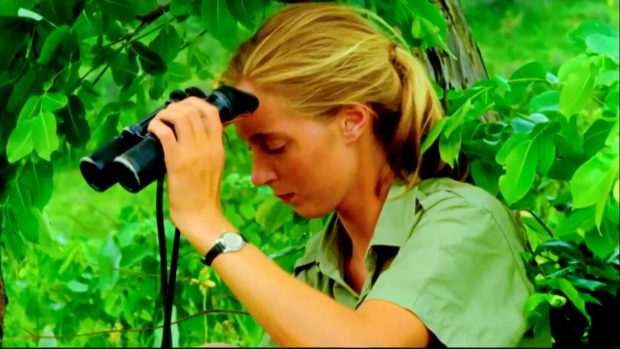 A documentary by Brett Morgen pays full and fitting tribute to one of the world’s most remarkable individuals, Jane Goodall.
A documentary by Brett Morgen pays full and fitting tribute to one of the world’s most remarkable individuals, Jane Goodall.
Drawn from over 100 hours of footage from the National Geographic archives that was long believed to be lost, and featuring a gorgeous musical score by Philip Glass, Jane, a documentary by Brett Morgen, pays full and fitting tribute to one of the world’s most remarkable individuals, Jane Goodall.
The film is narrated by Goodall herself, in an extensive interview with Morgen that covers her life up to the present, but focuses especially on the early years of her groundbreaking work studying wild chimpanzees. Since childhood she had dreamed of going to Africa and living with animals, and was hired when she was 22 as a secretary for the world-famous paleontologist Louis Leakey. Leakey wanted someone who could get close enough to chimpanzees to study their behavior closely. No one had done this. And instead of choosing a primatologist or other professional, he chose Goodall, who had no degree or field experience, because of her love and respect for animals, her total commitment to the project, and perhaps most of all, her patience.
In 1960 she was sent to Gombia, a jungle area and later a national park in what is now Tanzania, and because the area warden was concerned for the safety of a single woman, she was accompanied by her mother, who we learn was a strong supporter and nurturer of Goodall’s dreams and ambitions. After five months of observing a band of wild chimps from afar, but having them run away from her whenever she got closer, one of the older chimps was brave enough to let her approach, which led to her acceptance by the rest of them.
We see quite a lot of footage of her careful waiting and observation, which makes us ask, who was shooting this film? The answer is that after her initial breakthrough with the chimps, a National Geographic photographer named Hugo van Lawick was sent to join her. The early sequences are reconstructed by Morgen through some of this later footage shot by Van Lawick. Eventually, Jane and Hugo fell in love, got married, and had a son. That’s a big part of the story of this film, but more centrally, there’s the story of Jane’s love for the wild chimpanzees.
As time went on, she gave each of them names, and the picture allows us to witness the progress and development of her relationship to them, and their own stories, over a period of many years. Some of this is blissful, but there are dark times too, and along with Goodall we learn that there is a brutal side to these animals as well as a gentle side. Dominance is one of the primal forces driving social behavior in chimpanzees, and we can see too how this is similar in some ways to what we think of as the aggressive side of human nature. This intimate portrait of an animal community is moving and, for me, sometimes quite haunting—we become invested in the stories of these chimps as distinct individuals, and some of their fates are tragic.
Philip Glass has done music for films that has been very effective, and others for which, in my opinion, the music didn’t work. This is an example of one that fits the subject and lends it grandeur. Morgen is great at weaving the footage together with the music in powerful ways. The movie transcends the quality of what we expect from the average biographical film—its sensibility is stirring and poetic. Goodall’s evolution from a young adventurer to a world famous crusader for animal rights and conservation is presented clearly and vividly, not as the story of a saint but with all the mistakes and flaws freely admitted. Jane provides insight into core truths about life and the link between humans and other animals, and I came away from the experience deeply moved.

Gravity, directed by Alfonso Cuaron, steps away from the Star Trek / Star Wars type outer space film we’ve become used to, with their...

Hong Sang-soo’s wry film about a novelist who decides to make a short movie is a clever illustration of the Korean filmmaker’s own narrative...

The work of the film innovator who brought fantasy and illusion to the movies, is presented in a documentary and a collection of Georges...